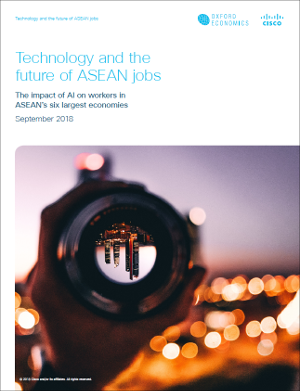Ungated Post | 12 Sep 2018
Technology and the future of ASEAN jobs

Technology will displace 28 million workers in the ASEAN region by 2028, but by boosting real incomes it will generate new demands for workers too. Jobs will evolve, rather than disappear, posing a considerable reskilling challenge to ASEAN workers.
Artificial Intelligence-enabled technologies will deliver substantial productivity gains across all sectors of ASEAN economies over the next decade, resulting in major benefits for businesses and prosperity for the region. However, this will have a significant impact on the labour market as AI-enabled technologies will make many skills sets, and job profiles, redundant.
In a follow up to Oxford Economics’ 2018 collaboration with Cisco, "The AI Paradox: How robots are making jobs more human", we have teamed up with Cisco to better understand the labour implications of Artificial intelligence in the ASEAN region. Which are the jobs that will be displaced by technology over the coming decade? Where will new jobs be created? And what skills challenges will this pose across the region? The report draws on input from a multidisciplinary team of experts to explore how technological change will manifest itself, how the labour market will evolve around it, and what skills shortfalls that will expose.
Our economic consulting team are world leaders in quantitative economic analysis, working with clients around the globe and across sectors to build models, forecast markets and evaluate interventions using state-of-the art techniques. Lead consultants on this project were:
Oxford Economics’ team is expert at applying advanced economictools that provide valuable insights into today’s most pressing business, financial,and policy issues.
To find out more about our capabilities, contact:
EMEA
Sam Moore
+44 (0)207 803 1415
Email
Americas
Hamilton Galloway
+1 (646) 503 3068
Email
Asia
Peter Suomi
+65 6829 7198
Email
Related Services

Post
KPMG M&A Outlook 2026: Between Uncertainty, Resilience, and Seizing Opportunities
Discover how Germany’s M&A landscape is evolving – with a focus on growth, AI and post-merger value creation.
Find Out More
Post
Silver, the next generation metal
This report highlights the critical role silver plays in data centres and artificial intelligence (AI), automotive and electric vehicles (EVs), and solar energy photovoltaics (PVs). With these sectors expected to expand significantly over the coming years, we expect future silver demand to be strong.
Find Out More
Post
Powering the UK Data Boom: The Nuclear Solution to the UK’s Data Centre Energy Crunch
The UK’s data centre sector is expanding rapidly as digitalisation, cloud computing, and artificial intelligence (AI) drive surging demand for high-performance computing infrastructure.
Find Out More